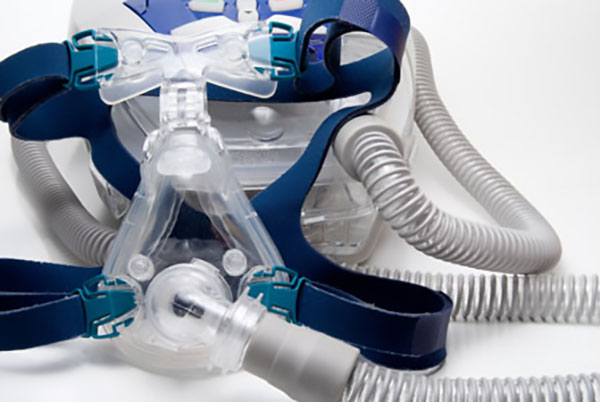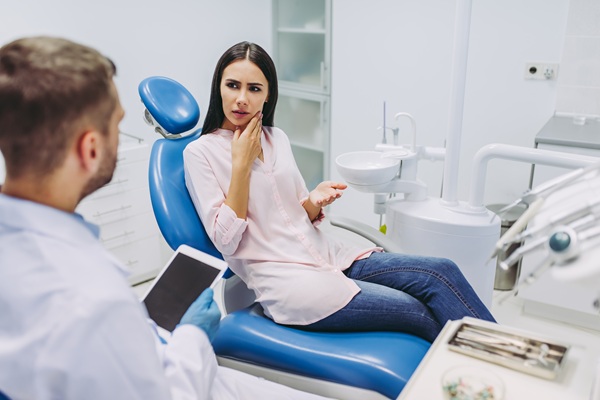Dental Oral Appliance for Sleep Apnea Treatment

For people with obstructive sleep apnea, a dental oral appliance is a common alternative to a continuous positive airway pressure machine, which is the treatment most often used to address this type of sleep disorder. A dentist can create a customized device similar to a mouthguard or retainer that fits over the teeth. If a patient has had trouble using a CPAP machine, it helps to know how a dental appliance works to reduce snoring and promote healthy sleep.
What is sleep apnea?
Sleep apnea is a type of disorder that disrupts a person’s sleep due to periods of interrupted breathing. There are three main categories of this condition, including obstructive sleep apnea, central apnea, and mixed apnea. OSA is the most common of the three types and occurs when a person’s breathing stops due to a blocked or collapsed upper airway. This results in a decrease in the amount of oxygen in the blood, signaling the body to wake up in order to breathe.
How can a dental appliance help treat sleep apnea?
The use of a CPAP machine or oral appliance is beneficial for people with OSA. Many people use a CPAP machine at night while sleeping, which uses a mask to deliver pure, pressurized air using a fan and filter. However, this treatment method is not ideal for everyone. Some people find it difficult to sleep with the noise the machine makes or find the mask uncomfortable.
In these situations, a dental appliance can help address the sleep disorder in a less obtrusive manner. While this solution may not be effective for people with very severe apnea, people with mild or moderate apnea may benefit from the way a mouthpiece places the mouth in a more favorable position for keeping the airway open. There are two main types of devices used for this purpose: Tongue retaining devices and mandibular advancement devices.
Tongue retaining device
Among people with sleep apnea, a larger-than-average tongue or excess tongue fat at the base can sometimes contribute to the condition. Additionally, lower placement of the tongue in the mouth can obstruct the airway and cause other breathing problems. A tongue retaining device pulls the tongue into a forward position. These mouthpieces typically feature a bulb section that the tongue sits inside and an area for the teeth to bite down on or a raised section that rests against the lips.
Mandibular advancement device
A mandibular advancement device looks similar to a mouthguard and is designed to move the jaw and tongue forward. When purchased from a dentist, a custom guard can be made that is designed to fit snugly over the teeth. The splint is only worn at night and can also help with snoring.
Conclusion
Living with obstructive sleep apnea can leave a person feeling tired during the day and restless at night. If you are not experiencing good results with a CPAP machine, talk to a dentist about using a dental appliance to help you get a better night’s sleep and feel more energized during the day.
Request an appointment here: https://www.lilburnfamilydentistry.com or call Lilburn Family Dentistry at (770) 800-0178 for an appointment in our Lilburn office.
Check out what others are saying about our services on Yelp: Read our Yelp reviews.
Recent Posts
A restorative dentist can complete your smile by replacing your missing teeth. This can bring back your oral health and self-esteem. Knowing what teeth replacement method will suit you can help prepare you for your appointment. Here are the details on how seeing your restorative dentist can replace your lost teeth.These removable dental replacements are…
A chipped tooth can affect your smile's appearance and oral health, leading to discomfort, sensitivity, and self-esteem issues. Fortunately, there are several effective options to restore a tooth's natural look and strength. A variety of treatments are available, depending on the severity of the chip, its location, and your treatment goals.A chipped tooth can result…
Restorative dentists do not only repair damaged teeth. They also enhance overall oral health. From addressing cavities to replacing missing teeth, these dental professionals provide a variety of treatments that restore the function of damaged teeth and protect your oral health.Restorative dentistry is the dental specialty that restores damaged and decayed teeth. These professionals also…
A restorative dentist plays an important role in dental health and aesthetics. Damaged or missing teeth can impact a smile's appearance and cause problems for oral health and function. This is why restorative dentists offer a range of repair and replacement procedures to keep a patient's smile looking and feeling the way it should.A restorative…


